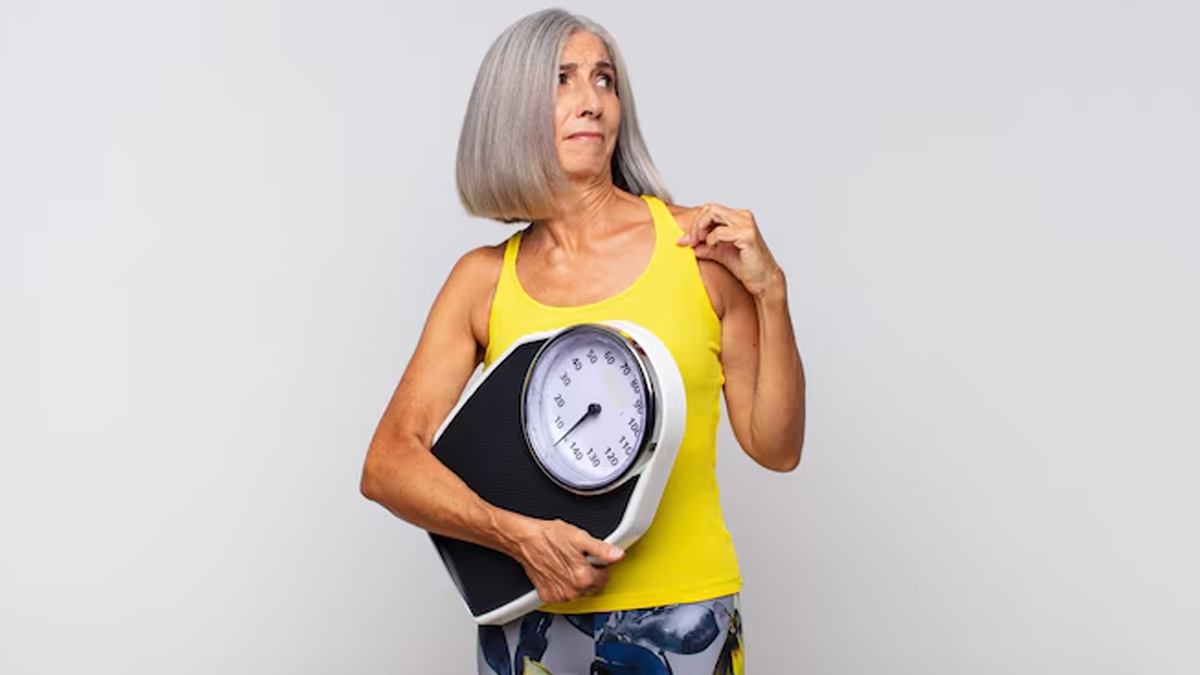
Menopause is a naturally occurring transition that marks the end of menstruation. It generally occurs in women aged between 45 and 55 and is deemed to have occurred after 12 consecutive months without menstruation, according to the World Health Organization (WHO).
Table of Content:-
With menopause come various physical, mental, and emotional changes. Some of the common symptoms include hot flushes and night sweats, vaginal dryness, difficulty sleeping, changes in mood, and more. Some women also experience an increase in weight, which is difficult to lose but not impossible.
In an interaction with the OnlyMyHealth team, Dr Sandhya Rani, Senior Consultant - Obstetrics and Gynaecology, Aster Women and Children Hospital, Whitefield, Bengaluru, explains the causes and shares tips to shed extra weight.
Also Read: Hot Flashes And Heart Disease: Is There A Link?
Possible Causes Of Weight Gain In Menopausal Women

Weight gain in menopausal women can be attributed to various factors, including:
Decreased oestrogen: Fat storage and metabolism are regulated by oestrogen; so, if a woman has less oestrogen in her body after the menopause, it becomes easier for fat to be stored, especially in and around the belly area.
Muscle loss: As we grow older, our muscles tend to reduce naturally. Since muscles burn more calories than fat, your metabolism will slow down as you lose or gain weight.
Lifestyle changes: Menopause usually coincides with life changes that increase the possibility of gaining weight, like a lack of time for exercise and increased stress.
Can Menopausal Women Maintain A Healthy Weight?

The short answer is yes, says Dr Rani.
According to the Mayo Clinic, on average, women tend to put on around 0.7 kg (1.5 pounds) each year. This can be attributed to a natural decrease in muscle mass, which in turn causes the muscles to burn more calories than fat.
Additionally, hormonal changes during menopause can contribute to weight gain, particularly around the belly area.
However, the doctor clarifies that menopause doesn’t always mean gaining weight. She also shares that with proper diet, exercise, and lifestyle changes, healthy weight can be achieved in menopausal women.
Also Read: Premature Menopause: Understanding Health Risks And Symptoms To Watch Out For
Strategies To Manage Weight During Menopause

Below are some tips on how to maintain a healthy weight after menopause:
Consider your diet first: Whenever possible, go for whole grains, fruits, vegetables, and lean proteins; restrict your intake of high-sugar beverages and processed foods that contain unhealthy fats.
Focus on exercise: Take about 150 minutes per week for moderate-intensity exercises or half this amount for vigorous-intensity ones. Add strength training workouts to your routine to help boost metabolism and build muscle mass.
Adequate sleep is necessary: One should aim to get between seven and eight hours of sleep every night. Hormones that control appetite and keep a check on weight are regulated by adequate sleep.
Lastly, you can also create a safe and effective weight-loss plan tailored to your needs in consultation with a doctor. Moreover, discuss if hormone replacement therapy is an option for you, concludes Dr Rani.
Also watch this video
How we keep this article up to date:
We work with experts and keep a close eye on the latest in health and wellness. Whenever there is a new research or helpful information, we update our articles with accurate and useful advice.
Current Version